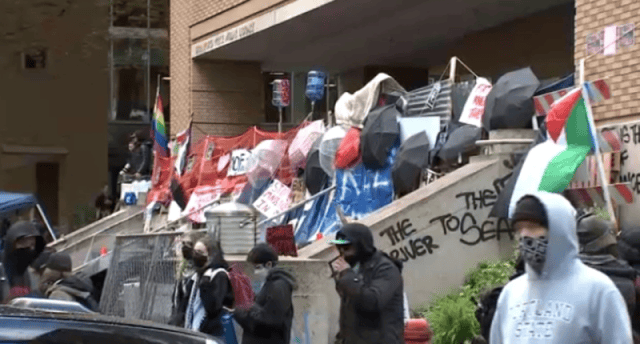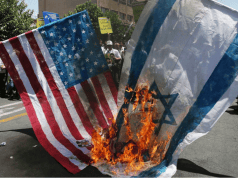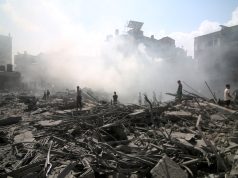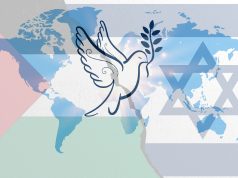By Rachel Avraham
For about a week in May, anti-Israel protesters were situated on the campus of Portland State University, demanding that the university divest from Boeing and other companies due to their ties to the State of Israel. They camped out in the campus library, where they put up tents, held rare book collections hostage, destroyed property and engaged in vandalism of campus property, spraying graffiti proclaiming “Viva Palestine,” “We will stop occupying this building when Israel stops occupying Palestine,” “Free Palestine,” “Remember the martyrs,” “From the River to the Sea, Palestine will be free,” etc.
They also called for an Intifada. The library coffee shop was renamed “Intifada Coffee Shop” and the library was renamed by the protesters as the “the Refaat Alareer Memorial Library,” after a Palestinian professor who taught at the Islamic University of Gaza that denied the mass rapes that occurred during the October 7 massacre. In the end, the police were called in to bring this violent take-over of the library to an end and many arrests were made, but the vestiges of this violent student movement remained.
The library remained closed and was not set to reopen for several months due to the extensive damage caused by these protests.
Even as of July 2024, remnants of the violent protests that went on there remained. In the area, one can witness signs saying “I love Gaza” and Palestinian flags everywhere, even after the protests supposedly ended. In July 2024, I visited the campus of Portland State University and saw signs that proclaimed: “PSU cut ties with Boeing,” “Justice for Jason, Disarm PSU,” and “Stay human, stop bombing Gaza” spread around everywhere.
Following the violent protests, a group of urban planning students submitted an open letter, calling on the Toulon School to condemn PSU for bringing in the police, demand that no penalties be put on students who participated in this violent protest, to condemn Israel, to call on PSU to cut all ties with Israel, and to have a student-led discussion on Palestinian history. They threatened punitive measures against the Toulon School if they did not comply.
Dr. Greg Schrock, Toulan School Director, replied to the pro-BDS students: “the diversity of identities, experiences and perspectives is a strength of the Toulan School, but it also makes it difficult if not impossible to make any singular statements. For this reason we do not feel it is appropriate to make any statements on behalf of the Toulan School as a whole at this time.” However, he did state: “One of your other requests pertains to academic penalties for students who participated in protest actions, including the occupation of the Millar Library. We – School and Program Directors – commit to working with individual students to ensure they are not subject to additional program-level penalties as a result of participation in peaceful protest activities.”
He also added a carrot to the anti-Israel petitioners, hoping to appease them: “Finally, you called on the Toulan School to create an “inclusive, ongoing, and thoughtful conversation” about Palestinian history. Our faculty sees value in this, and we welcome your ideas on how to engage this topic from an “urban” perspective through guest speakers or other public events organized by the Toulan School or the Center for Urban Studies. A caveat to this invitation is that our faculty capacity to support in-house events of this kind will be highly limited next year due to pending faculty departures. For this reason we also commit $1,000 to co-sponsor events happening elsewhere on campus, including through Planning Club and other student groups.”
A South Korean student, who spoke on the condition of anonymity, stated that she and other international students did not participate in the protests because they were warned that their student visas could be revoked, but that she “supported the Palestinians. However, my views are being challenged by Israeli doctoral students in the urban studies department, who are always questioning my way of thinking.” Apparently, there is an Israeli doctoral student studying in the urban studies department at Portland State University who is very active in protesting pro-BDS activity on campus, but she declined our request for an interview, likely due to the hostile atmosphere that exists on campus.
Another student, who spoke on the condition of anonymity, said that some of the protesters arrived with weapons and that most of the people there occupying the Portland State University library were not even students at Portland State University. He added that like everyone, he was suffering from the closure of the library and struggling to make it in university without having access to a library. However, he has managed to survive this situation because he was always tech savvy and able to manage to do his own research online from home.
Who was Responsible for the Lack of Adult Supervision at Portland State?
For about a week, anti-Israel protesters were situated on the campus of Portland State University, demanding that the university divest from Boeing and other companies due to their ties to the State of Israel. Daniel Salomon, a Jewish doctoral student at Portland State University, claims that Boeing is a major employer in the Pacific Northwest and provides minority scholarships to students at Portland State University: “Boeing also apparently supports Israel. They make airplanes and other military stuff. For the BDS, it is all about Boeing.”
“It started out as an outside protest and then they took over the library, and then it became unsafe on campus,” Salomon related. “The campus was shut down for three days. We still don’t have access to the library. They ended up vandalizing the library, but they did more than that. They destroyed the computer system. It is impossible till the fall to get books from other libraries. You cannot check out books from the library. They are actually telling PHD students to go to the public library.”
According to Salomon, “They also messed up the fire system. That put in jeopardy a lot of rare collections. Apparently, I heard that the librarians made a deal so that they would not walk off with one of the rare collections. One of the collections that was in danger was Japanese American. They also put graffiti all over the library and destroyed a lot of chairs.” They put up graffiti proclaiming “Viva Palestine,” “We will stop occupying this building when Israel stops occupying Palestine,” “Free Palestine,” “Remember the martyrs,” “From the River to the Sea, Palestine will be free.” They also called for an Intifada. The library coffee shop was renamed “Intifada Coffee Shop” and the library was renamed by the protesters as the “the Refaat Alareer Memorial Library,” after
a Palestinian professor who taught at the Islamic University of Gaza that denied the mass rapes that occurred during the October 7 massacre.
The question remains, who was responsible for the lack of adult supervision at Portland State University? Salomon claims that at first, the president of the university was reluctant to call in the police, but then the protest went on for too long and too much damage was caused, so she had no choice: “Apparently, after 2020, a student was murdered by the police on campus and then we had George Floyd, so the police were disarmed on campus. Only relatively recently due to the homeless issue were the police starting to carry arms again. For this reason, the president of the university did everything including getting on television to get the people to leave voluntarily.”
However, Salomon noted that no one listened to the president of the university: “She gave them a deal and they refused. If they had accepted, they would not have gotten into trouble and would have been given the chance to talk to officials to voice their grievances and to have a Palestinian poetry exhibit. They said no to that. Yet a whole group of them walked out on their own, but some of them stayed. Then she brought in the police and then there was a siege. I saw a lot of nasty stuff where people blamed the president of PSU for what is happening to the Palestinians by Israel.”
Salomon noted that one of the most disturbing placards he saw at the protests proclaimed “we are in solidarity with the martyrs.” In the period leading up to this, Salomon noted that there were other protests, where one could witness a “sea of Palestinian flags. They were nationalist. They were not peace rallies. I felt as if I was in the Middle East at times for the women were covering their hair.”
Salomon blamed the president of the university for this mess because “she kept the police at bay as long as she could. But a lot of these people are angry at her for she brought in the police at all. But she eventually brought in the police so that we could save the library and reopen the campus for it was impacting all of the students and creating equity issues. Apparently, the librarians made deals with them about not destroying the rare book collections. But eventually, the police came in and there was a siege. Nevertheless, the president of the university held off the police as long as possible. However, there were other actors. She came over to negotiate and so did professors and librarians.” Yet, nothing short of bringing the police in brought the violence to a halt, and much of the library could have been spared if the police were brought in sooner. Indeed, the damage that these protesters did to the library at Portland State University was reminiscent of what ISIS did to Palmyra.
Salomon noted that there were a number of follow up demonstrations, where students chained themselves to buildings on campus: “One of the incidents was so bad that the chief of police ended up in the hospital because of heart issues due to the stress of it all. He was stressed because he had to use force to get these students to leave the campus. They had chained themselves to the building. It broke his heart for he had no option but to use the force. There is a lot of anti-police politics on campus. Because of that, the president of the university held off on calling in the police as long as she did.”
But in the end, there was no choice but to use force and the situation would have been better if the police were called in sooner and did not have a history of being unarmed for a number of years.





